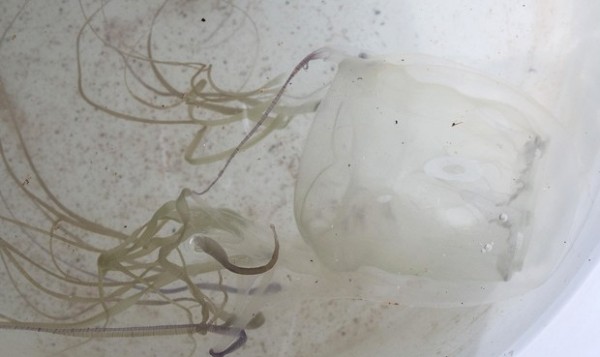By Ana Verayo, | March 21, 2017

A sting by this Australian box jelly can lead to death in as little as 5 minutes. (A Yanagihara/UH Mānoa Pacific Biosciences Research Center)
Scientists say that the current treatment for jellyfish stings are not only ineffective but these will make your skin even more aggravated. These treatments include putting ice on it and urinating on stings.
According to the lead author of the study, Angel Yanagihara of the John A. Burns School of Medicine at the University of Hawaii in Manoa, when you search online about how to treat jellyfish stings, authority web articles suggest treating the sting with ice after rinsing with seawater and scraping off remaining tentacles. In this new study, researchers re-examined those methods and put them to the test under lab conditions and discovered that they apparently make stings much worse.
Like Us on Facebook
For this study, scientists carried out experiments where they designed a human tissue model and exposed it to a jellyfish to receive some stings. Two species of jellyfish were used for this experiment, the Hawaiian box jelly Alatina alata and the Australian box jelly Chironex fleckeri, which is also the largest of its kind in the world.
Every year, dozens of swimmers die and hundreds suffer from stings due to box jellyfish, making them more dangerous than sharks. This new study tested how common sting remedies like ice are aggravating these conditions and even cause the tentacles to release more venom. Urinating on a jellyfish sting can cause tentacles to release more venom, making it worse in the long run.
According to Christie Wilcox from the John A. Burns School of Medicine at the University of Hawaii, when you are initially stung, less than one percent of stinging cells actually eject venom. When you move, that causes the tentacles to move, those stinging cell capsules around the sting area can significantly increase the injection of venom.
The researchers have recommended some sting treatments that work. Rinsing or dousing vinegar on tentacles can prevent venom release on the sting area. Using tweezers to carefully pick the tentacles away from the sting area can also improve the situation.
Yanagihara explains that box jellies are incredibly dangerous creatures. When they inject more venom, the victim will suffer more even life-threatening symptoms. Common treatments like ice, scraping off tentacles and urinating on them can increase venom injection activity, and this can mean life or death.
This new study was published in the journal Toxins.
-
Use of Coronavirus Pandemic Drones Raises Privacy Concerns: Drones Spread Fear, Local Officials Say

-
Coronavirus Hampers The Delivery Of Lockheed Martin F-35 Stealth Fighters For 2020

-
Instagram Speeds Up Plans to Add Account Memorialization Feature Due to COVID-19 Deaths

-
NASA: Perseverance Plans to Bring 'Mars Rock' to Earth in 2031

-
600 Dead And 3,000 In The Hospital as Iranians Believed Drinking High-Concentrations of Alcohol Can Cure The Coronavirus

-
600 Dead And 3,000 In The Hospital as Iranians Believed Drinking High-Concentrations of Alcohol Can Cure The Coronavirus

-
COVID-19: Doctors, Nurses Use Virtual Reality to Learn New Skills in Treating Coronavirus Patients







